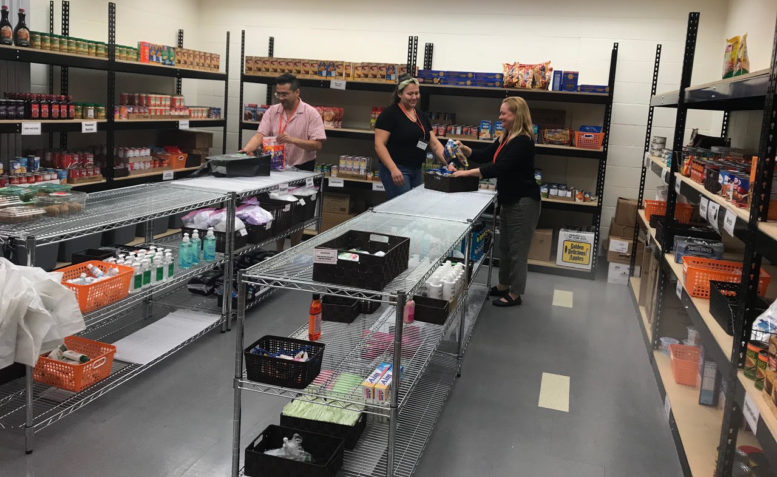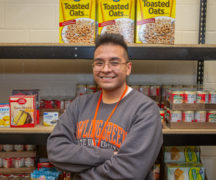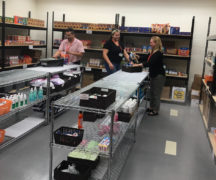By DAVID DUPONT
BG Independent News
An open house celebration of the Falcon Food Pantry will take place Friday, Oct. 14 at its home in room 109 in Central Hall on the BGSU campus.
The food pantry opened at the end of January, and “it’s been bananas” since, said founder and director Shannon Orr.
They had 10 people the first day, and since then the pantry has served 150 people a week. “And it just gets busier and busier,” she said. One day interns arrived to open and there were 21 people lined up down the hall.
The pantry is open three days a week – Monday 11 a.m. to 1 p.m., Wednesday, 2:30-5:30 p.m., and Thursday. 10 a.m. to 1 p.m.
People in need – students, staff, or faculty – are welcomed to fill a reusable bag that they receive on their first visit . “Any Falcon can come once a week,” Orr said.
Some people they see occasionally; others visit weekly. There are no eligibility guidelines. “We’re more interested in getting people in here than being gatekeepers,” said Orr, a professor in political science and the Master of Public Administration program. The aim is to have a “fun and happy place” that people aren’t ashamed to come to.
In a survey of students done in late 2021 a significant number said they would use a food pantry.
“People don’t often think of students as having food insecurity,” she said. “But we hear the stories every day.”
They are stories of students working 40-50 hours a week on top of their course load. Or a student who thought they were financially secure, until their father lost his job. Or the international student who had enough savings, until the value of their home currency dropped in relation to the dollar.
Madelyn Huzyak, one of the seven interns who staff the pantry, said that a survey showed just over a third of those who patronize the pantry are graduate students, about the same number as undergraduates. That’s surprising, she said, given undergraduates far exceed graduate students. As of this semester there are just over 13,000 undergraduate students on the Bowling Green camps and almost 3,100 graduate students.
The remaining users either didn’t specify their status or are staff or faculty.
Orr said the large percentage of graduates who use the pantry reflects the harried lives of graduate students who work, teach, take classes, and do research.
This is especially problematic for international students, who can only work on campus for limited hours.
The pantry stocks items, such as basmati rice, that would appeal to students.
Lorenzo Zamora, the graduate assistant who works with the pantry, said ramen is popular, as are various varieties of canned beans, and canned salmon.
Canned vegetables are less popular, though any fresh vegetables are snapped up.
Orr said hygiene products and diapers and baby wipes are in demand.
The pantry also provides boxes made up specifically for those with gluten and food allergies.
The pantry takes donations – they just got a load of pasta sauces that sell for $8 in the supermarket. And the pantry works with the Seagate Food Bank, Feeding America, and the Toledo Northwest Ohio Food Bank.
They also benefit from collections on campus. The classified staff conducted a drive as did the sorority Delta Zeta.
Monetary donations allow pantry staff to go shopping to fill in the gaps of what’s otherwise available.
Some products have cards with brief suggestions about how the product can be used and QR codes that send the visitor to a site with recipes and nutritional information.
The pantry does have a cooler for meat and other perishables. It will soon have a freezer courtesy of Swipe Out Hunger. That will allow the pantry to stock frozen vegetables and meat.
In addition to the pantry, students can pick up bags of food at the library. This extends the hours that the service is available.
Orr said the open house next week will raise awareness of food insecurity on campus. “Sometimes it’s hard to see the student need.”



